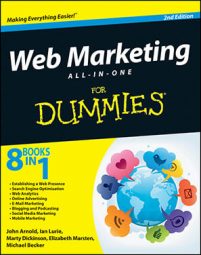Before bringing out the credit card and keyword list, make sure you’ve done your web marketing homework so you can select a search engine’s pay per click (PPC) platform that is right for you. Although the search engines may seem to be pretty similar, they differ on some big points.
Also, depending on the industry or field that you’re advertising for, one engine could be much more beneficial than another in terms of return on investment (ROI), audience reach for volume and targeting, costs, and time spent managing your campaigns.
Research search engines
Before you set up a new account on a search engine for PPC advertising, be sure to research the engine to see whether it meets your needs and those of your industry. Some PPC platforms are geared to business-to-consumer sales, for example; others target business-to-business sales. Some engines have considerably more traffic than others and are on the rise; others are falling off.
The best way to check out a search engine is to use it yourself. Perform some searches for items in your keyword list to see how much competition you have, how much search volume the engine has, and what the results page looks like overall. If the engine’s user interface is clunky and the ads are hard to find, those results are indicative of the performance of the ads.
If you can’t find what you’re looking for, how would you expect anyone else to find it? If the ads aren’t in prominent places on the results page (such as across the top or down the right side), users aren’t going to look at them.
Compare the top three search engines
The top three search engines, in order of search volume, are Google, Yahoo!, and Bing. They’re tops in terms of volume of traffic (searches performed), quality of results, quality of the ads that appear with the results (relevancy), and the average cost per click (CPC) compared with ROI. Here’s how the top three compare:
Google: This engine is by far the most sophisticated PPC search-engine platform overall, and it delivers the best bang for your buck. It has the most traffic and the best management tools, and it garners you results faster than any other search engine. Through Google, you should be able to find out what works and what doesn’t work within a short period.
The audience that uses Google is greatly varied; therefore, a large, diverse audience will be searching for your product or service.
Yahoo!: This engine teamed up with MSN in 2010, and ads served on Yahoo.com and Bing.com now come from MSN adCenter. You cannot segment whether your ads are shown on Yahoo.com or Bing.com; all search traffic is aggregated and shown as one source. If you want to show ads on Yahoo.com, you’ll need an MSN adCenter account.
Bing: This engine has less search volume than Google does, even with the addition of Yahoo.com search traffic. While it is lower in volume, MSN adCenter can be lower in costs and simpler to manage overall. It has the advantage of being the default search engine for many Windows and PC machines. If you’re targeting a less technically savvy audience, this could be an advantage for you.
How to manage multiple PPC accounts
If you plan to have an account that encompasses more than one PPC account, you’ll want to look into setting up a main account so that you have to log in to each engine only once to access all the accounts.
Google provides a my Client Center account for this purpose.
MSN’s comparable multiple account service doesn’t have a special name. You need a customer service representative to help you set up this account. If you don’t want to do that, you could also use its Agency Management option to handle multiple logins and access.

